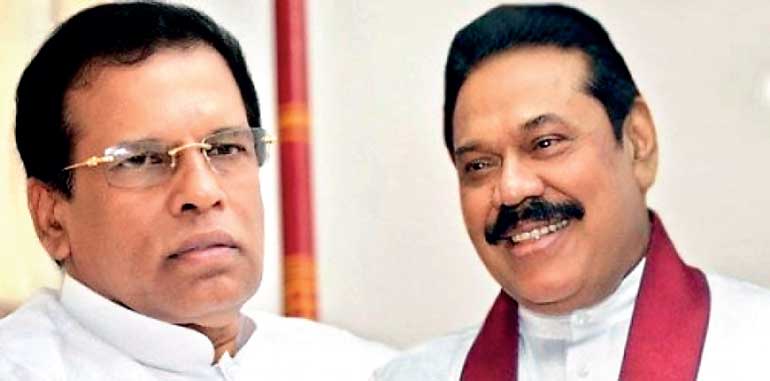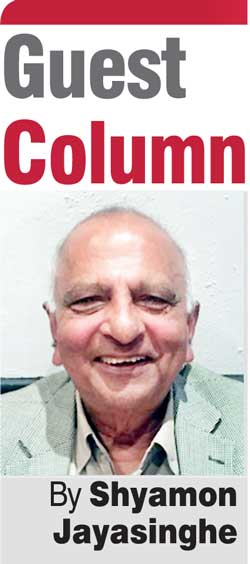Monday Feb 16, 2026
Monday Feb 16, 2026
Monday, 1 January 2018 00:00 - - {{hitsCtrl.values.hits}}
A political class siphoned off from the people
Sri Lanka, paradise, is never short of drama. Unfortunately, the ordinary people and their urgent needs for a better life are being ignored by moves and counter moves, conspiracies, rackets, deals and whatnot of the rotten political class which saw its rise to peak under the hopeless regime of Mahinda Rajapaksa, his family, cabal and cohorts. Never before has the island witnessed this phenomenon of a political class so cut off from the people. Would J.R. Jayawardena have ever known that his Constitution was pregnant with this unfolding dreadful reality?
Today, the political class decides and the people, reduced to desperate levels of expectation, have no option but to follow. The political class is never drawn from the grassroots as during general elections prior to the JR Constitution. Those days, intending members of parliament have had to first get clearance from the electorates they wish to represent. If fortunate to be elected, they have to keep being accountable to that source electorate. We did have some electorates like Colombo Central with multiple MPs but they were few. Each electorate had an MP who was beholden to his source of power.

It is a question of party officials picking candidates today. Here comes the creepy fellows and those of undesirable quality. We had an MP who once stole necklaces from helpless females who passed by. We had criminals, rapists and public cheats. A presidential pardon had been given to the wife of one MP who was convicted of double murder. We had bottle shop kings. Over 80% had not passed the O-level. In India, 60% are graduates. This is the pass we have come to today.
Double game
The current officially announced intentions of some MPs of the pro-Rajapaksa clan whom President Sirisena unfortunately invited to the Government have ever since been playing honkey dory. They are officially in the Unity Government but keep criticising at will Cabinet colleagues from the other side.
Susil Premajayantha, that guy who bears the name of a former film star, John Seneviratne, the Minister of Labour and the Sports Minister Dayasiri Jayasekera have all recently expressed their “disappointment” of having tried but failed to “bring the SLFP together”, implying the co-opting of former President Rajapaksa on board.
One would wonder what this trio had been doing since they took over their portfolio from the President; like to know their records as ministers under the Unity Government. Nothing that we can think of.
Dayasiri has been well and truly messing up Sri Lanka Cricket. Susil has still to answer for how he allowed the petroleum corporation suffer the huge fraud around the hedging experiment during his days spent under Rajapaksa. John Seneviratne appears a simple nitwit unable to make any notable headway in our labour legislation.
Sirisena on a suicide mission
President Sirisena can easily ask them to get off the back of the Government as he would lose nothing by that and gain the respect of the public for manifesting leadership qualities. Our daily experience is that Maithripala Sirisena has become a national disappointment and that he is showing up badly, having lost all clarity in thinking about his own future. He seems to be on a suicide mission attempting to get the SLFP together and be back cosily with the former dictator who on his once-stated assessment would have sent him six feet under had he lost the Presidential Elections.

President Maithripala Sirisena and Mahinda Rajapaksa
This is the state of the isolated political class. Nothing of this development has any bearing on the lives of ordinary people. The political class decides and the people must follow.
Birth of the SLFP was not ideological in nature
Let’s take a look at the so-called attempts to put the SLFP together. My honest concern is, even given an honest intention on the part of its protagonists, is it worth the exercise?
The Sri Lanka Freedom Party was born when S.W.R.D. was unfairly denied succession to the leadership of the UNP in which he was Minister. D.S. Senanayake wanted to put his son Dudley in the play and manoeuvred his way toward that. S.W.R.D. smelt it and resigned to form the new party. It was not an ideological rift. The ideology S.W.R.D. developed was an afterthought and it was designed to access power by playing to the base primary emotions and irrationality of the people - their race and language. The strategy worked to full measure and the UNP was vanquished.
On three major counts the SLFP of S.W.R.D. Bandaranaike and the party post-SWRD can, with absolute justification, be shown to have been a catalytic bane and not a boom for Sri Lanka.
The arousal of communal feelings between the Sinhalese and Tamil communities is the first count. I remember S.W.R.D’s election campaign as a young man those days. I even worked for the postal peon, Themis, who S.W.R.D. chose for the Colombo Central electorate. I had just then entered university. The slogans of S.W.R.D’s collaborative outfit, the MEP, were racist and were divisive of any move to build a Sri Lankan nation. Communal riots followed.

The disease was carried over to the next UNP Government under J.R, who was also responsible for communal riots ably aided by his mad Minister, Cyril Mathew. To be sure, that was unusual for a party like the UNP. However, the unfortunate trend that S.W.R.D. gave rise to had the potential to infect even the grand Old Party of National Unity. The ground was set.
This leads us to the second count and that was the devaluation of the English language from its pedestal of being the growing medium of national unity among all races and ethnic groups. India still gives prime place to English and it is English that binds that nation together and not Hindi. I met the Punjab community in Melbourne recently at a function. They told me most Punjabis do not understand Hindi and that it is English that is the real common communicating medium.
To S.W.R.D. it was a fight for ‘Sinhala Only’. Colvin R. de Silva’s famed prophetic utterance: “One language, two nations; two languages one nation,” had been ignored. If English had been allowed to build up, Colvin’s “two languages” would not have been much of an issue.
I quote from today’s issue of The Island an article written by Professor HL Seneviratne: “Had we retained English as the medium of instruction, we would today be exporting not unskilled labour to the Middle East, but doctors, engineers, lawyers and other professionals to wherever they are needed….It is hardly necessary to get into the questions of the brutal ethnic war, the politicisation of every institution, the rise of a barbaric political culture replete with corruption, nepotism, abduction and murder, and the overall hospitalisation of the body politic, which are all direct outcomes of the short-sighted policies of 1956.”
Sri Lanka then had an efficient system of Central Colleges that attracted bright students from the village level and gave them a good education in English, while at the same time teaching them about our proud inheritance in the Sinhala and Tamil ethos. Our best contemporary Sinhala and Tamil scholars came from these Central Colleges and they were also thoroughly bilingual! They were able to take Buddhist philosophy to western universities and teach there.
To be sure, the Central Colleges did have their imperfections. The main issue was the paucity of teachers in the English medium. However, that could have been addressed and the teaching of that language could have spread to other schools under the wings of Central Colleges. Today, even our good scholars are struggling with trying to be bilingual. Even Central Colleges are losing English.
I do some interpretation work for the growing Sinhalese community here in Melbourne and it is sad to see that young men and women are increasingly losing their bilingual ability.
The third wave of damage wrought by the SLFP was the introduction of populist socialism, particularly after the party attracted the Old and declining Left elements, the influence of socialism engulfed the psyche of the people so much so that the slogan ‘Danapathiya Bangawewa’ is still catchy in the villages.
The erroneous and dangerous value of denouncing investors with capital, who alone can take the economy forward, had been firmly implanted in our society as an unquestionable premise.
As in the case of racism, this damaging social value had the potential to infect even the Grand Old Party so much so that JR’s constitution officially launched Sri Lanka as a ‘Democratic Socialist Republic’.
Under the SLFP leadership of Mrs. Sirimavo Bandaranaike and the Left, the country simply went to war with capitalists. It was all a strategy of invading our society and economy with a populist version of socialism. Estates were broken up from being viably-sized ones into smaller uneconomic lots and distributed to the people who were bereft of any capital and skill to handle them. Our proud planters left the country to do their planting under the invitation of Kenya. Kenya is today the number one tea exporter while Sri Lanka has slipped back to number four!
All our usefully and efficiently-run private service businesses like the bus service were taken over and we replaced that with a Government-run bankrupted CTB. People now suffer in smelly buses jam-packed with passengers, pickpockets and perverts. The Government invaded trade and got the CWE and Marketing Department (I was once Commissioner of that) to do trading under the guise of helping bring down prices. These institutions attracted the growing army of the disguised unemployed who were put in by MPs. They ignored the basic concept of supply and demand economics and paid the penalty. Governments should never trade.
In this fashion, everything was taken over and the State ran the economy under Mrs. B. That kind of popular socialism was basically the distribution of poverty and it rendered helpless any attempt by men with capital to play the lead role as we have since seen all over the world including China and Russia.
Sri Lanka was, surely, well on the road to economic ruin until the UNP came in 1977 and rescued it with the revolution of the liberalised, open economy.
The plain fact is that the SLFP has never brought any major development project of catalytic national impact. It is the party that shares poverty, turning our nation into a miserable population waiting for government benefits.
Conclusion
A lot more could be said but this is adequate to take the conviction base off the party known as the Sri Lanka Freedom Party. It is a backward step to try and revive that moribund entity. One observes President Sirisena making a pathetic effort to rebuild it. Images of undignified ceremonies (unbecoming of a Head of State) to welcome recalcitrant elements from the “other sides” are seen in the daily media. Portfolios are being created and offered to encourage crossovers at election time. This isn’t a flattering example of ensuring a clean election.
It is all a nauseating performance carried out in true Mahinda Rajapaksa style, which represents a celebration of opportunism, incompetence and an implied element of promised corruption.
According to the famous Peter Principle in Management, Maithripala Sirisena has reached his level of incompetence. Until a few months ago, he did handle the job of Head of State in the statesmanlike way that such an office demands. Now one observes that it all seems too much for him.
He should therefore continue to be what he was, preside gracefully and quit the job as he promised at the end of term. He would then leave behind a hallowed memory. If he goes on like this, I predict a backlash that will consume him.
[The writer can be reached at [email protected]]